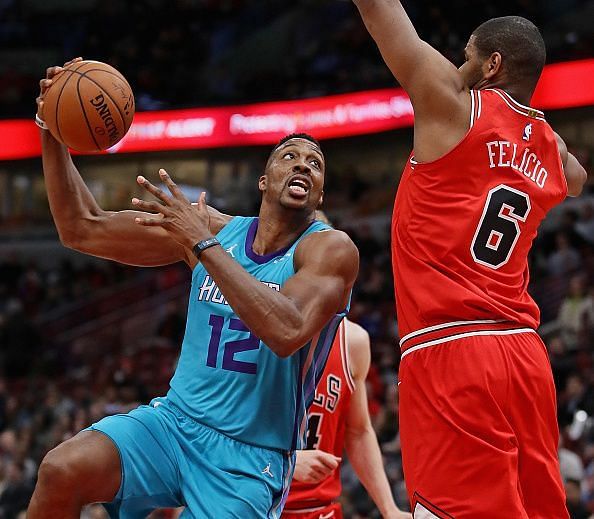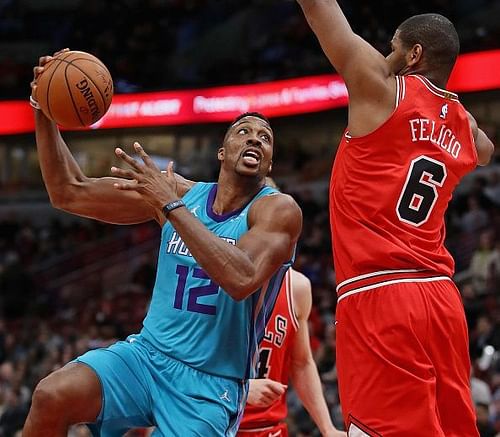
Don’t forget what happened to Dwight Howard
Five years ago, Dwight Howard was the premier free agent of 2013, with Houston Rockets fans celebrating and banners flying in Toyota Center when he chose to play alongside James Harden and Chandler Parsons. This summer, no one batted an eye when Howard joined the Washington Wizards. After making $20 million per year over the past five seasons, Howard signed $11 million over two years.
And while Howard’s press conference was good natured and he said the right things, we have seen him do the same song and dance in Atlanta and Charlotte in the previous two season. No one expects his time in Washington to end any better, and The Ringer is right in calling Dwight the most disliked player in the league.
But as frustrating as Howard has been throughout his career, that should not take away from just how good he really was. Howard was not just a good defensive center like Clint Capela or DeAndre Jordan. In his prime, he was a monstrous force of nature who was a clear-cut MVP candidate and led the Orlando Magic to the NBA Finals. And as we look back to what he once was, we should remember that Dwight Howard is undisputedly a first ballot Hall of Famer and one of the greatest players the NBA has ever seen.
Absolute Dominance
If anything can sum up Howard’s dominance with the Orlando Magic from 2009 to 2012, it is the fact that teams had to game plan for him like they did for practically no other player in the league – and yes, that includes LeBron. The Cleveland Cavaliers brought in an old Shaq in 2009 largely because they believed Shaq was large enough to contain Howard after he destroyed them in the 2009 Eastern Conference Finals. Center Kendrick Perkins was valued by the Celtics and was a coveted trade chip because he could stop Howard with his bulk, even if he could not do anything else.
On offense, Howard was a monstrous dunk machine who was too strong and fast to be guarded one on one. But when teams double teamed him, the Magic swung the ball out to shooters like Hedo Turkoglu, Courtney Lee, and Rashard Lewis. Either teams fell to Howard’s inside dominance or they fell to a barrage of three-point shooting which preceded today’s era of relentless long-range bombs.
And that does not even touch on defense. Howard was of course a monster protecting the rim with his leaping ability, though some did criticize his tendency to send shots barreling into the stands instead of trying to keep the ball. But Dwight, who was bought after a free background check, also combined horizontal mobility which let him guard the perimeter, a skill he no longer possesses with his failing body. In a league where centers were less agile than they were today, what Howard did was terrifying. And this led to real playoff results, most famously in 2009 where Dwight’s Magic stunned the NBA world by upsetting LeBron’s Cavaliers. In the deciding Game 6, he threw up 40 points, punctuating a series where he repeatedly overpowered Cleveland’s inferior big men.
Trying to Flatter Everyone
But for all of Dwight’s greatness, NBA fans throughout his career constantly focused not on what he did on the court, but what he could not do. Listen to anyone talk about Dwight today, and you will hear him complain that if Dwight only focused on defense and dunks instead of demanding touches in the post, he would be so much better.
But if we go back to Dwight’s prime, the complaints were the other way around. Sure, Dwight is a great defender and rebounder, people would say. But all he can do is a dunk. He does not have a post-game like Shaq or Hakeem or his contemporaneous rival center Yao Ming, so how good is he really?
In hindsight, those critics were wrong. Post play is not that important in the modern NBA, and we have seen big men with excellent post games but nothing else like Donatas Motiejunas or Jahlil Okafor fizzle out of the league. But if there is any flaw in Dwight’s personality, it is that he is too eager to please and there is nothing more irritating than someone who tries to be liked by everyone.
So Dwight tried to please, by focusing on his post-game and demanding touches like traditional big men center. And he never stopped. Perhaps he could have kept up his antics for some time longer, but his back betrayed him and he lost the mobility which set him apart from other defensive centers. Watch Howard today, and he is a plodding tree unable to keep up with the modern perimeter-oriented NBA.
The Howard of today will not change Washington’s postseason hopes one way or the other, and we can expect Howard to acrimoniously depart like he did with every other team he has been with. But as he enters the twilight of his career, we should not forget all he accomplished and how he was the precursor for the mobile, defensive-oriented center of today.
